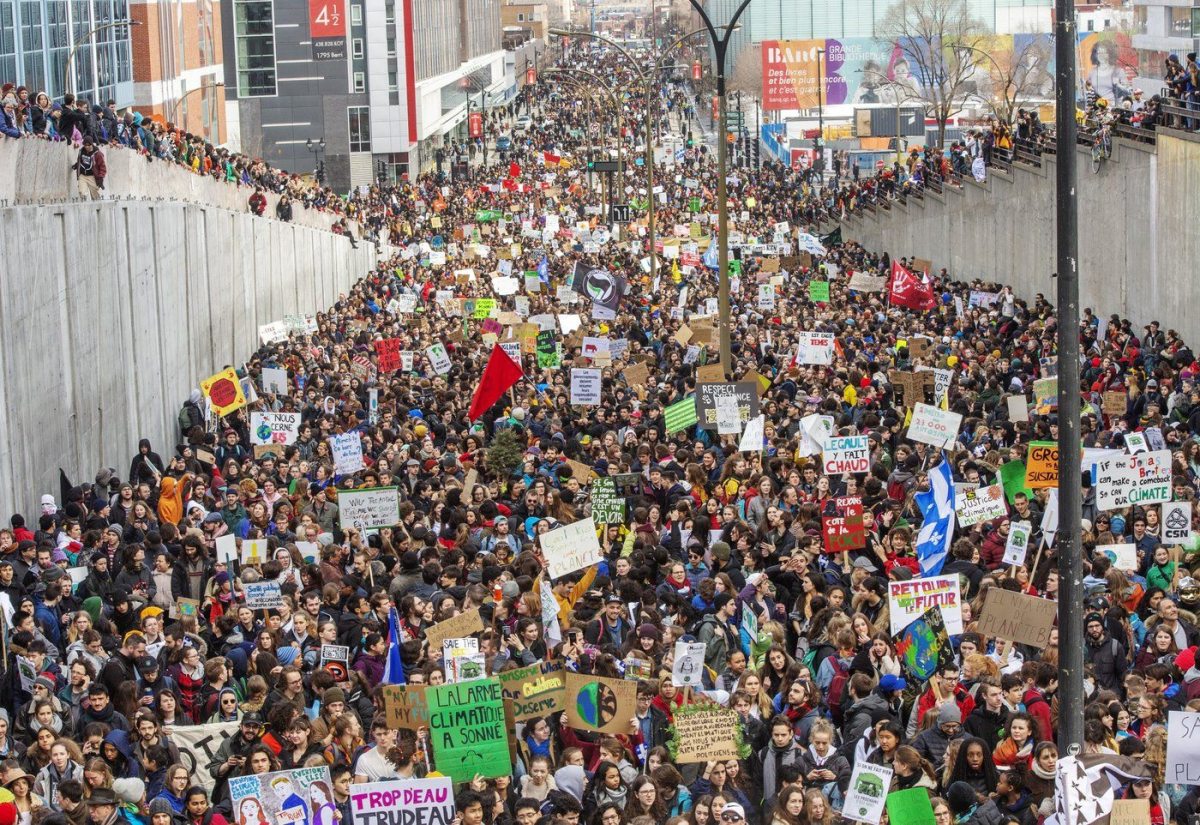Support strong Canadian climate journalism for 2025
As they marched through the streets in 2019, Ashley Torres and Louis Couillard did not expect a protest would alter the trajectory of their lives.
Then 23 and 22 years old, the student organizers did not expect tens of thousands of people would turn up in Montreal for the youth-led global climate strike.
They did not expect, five years later, to be dedicating their lives to climate justice as campaigners for non-profit advocacy groups. And the pair, who met during a feverish series of organizing meetings ahead of the March 15 protest, did not expect to be raising a two-year-old daughter together.

"It became this pivotal moment in my life where it really just sort of changed the direction quite a bit and really solidified what I wanted to do with my life," said the now 28-year-old Torres, who works with Mères Au Front, a movement of mothers organizing around climate change.
On March 15, 2019, hundreds of thousands of young people around the world left their elementary school classrooms and university lecture halls to take part in a global climate strike inspired by Swedish activist Greta Thunberg's "Fridays for Futures" movement. The spark lit by the strike set off months of concerted activism in Canada, culminating in Thunberg's tour of several major cities and the massive September strikes regarded as some of the largest youth-led protests in the country's history.
In interviews ahead of Friday's anniversary, organizers reflected on the strike's legacy and its effect on their own lives.
And as the planet warms and Canada struggles to meet its climate targets, they also spoke about their continued hope in -- and the renewed urgency for -- a youth-led climate movement capable of recapturing the attention garnered in 2019.
"It's going to have to come back, this momentum," said Couillard, who now works as a campaigner with Greenpeace. "Maybe it's not going to look the same. Maybe it's going to be a different one. But ... our situation needs us to come together."
Organizers described forging lasting bonds with other organizers, facing hateful critics and coping with the blow to the movement's momentum dealt by the COVID-19 pandemic. Several spoke about how the strike also charted them on a path to pursue full-time climate advocacy.
For Alienor Rougeot, a lesson from her time as a Toronto organizer remains true five years later. It's a lesson that she says was instinctive for many Quebec organizers, who took cues from the massive 2012 student strikes against tuition increases, but became increasingly apparent to people in other parts of the country.
"I think the rest of Canada's students don't necessarily realize that being together every day, many hours a day with peers is a huge potential for organizing," said Rougeot, who in 2019 was an economics and public policy undergraduate student at the University of Toronto.
Rougeot, now 25 and working as a program manager for Environmental Defence, says she's regularly in touch with student activists who wonder what will be the climate movement's "next big thing." She takes inspiration from a group known as Change Course, which targets Canadian banks and fossil fuel financing.
"They're more specific in a way, more targeted, more strategic. So, that's how I'm seeing it re-emerge," she said.
Part of the appeal of the student strikes in early 2019, as well as its weakness, was the simplicity of the message and demands, some organizers said. While calls for "climate action" and to stop global warming could rally large numbers, the vagueness of the message meant it could be co-opted by people with varying agendas, said Rougeot.
The March 15 strike gave way to other large-scale protests over the ensuing months. In its wake, a network of student activists came together to form Climate Strike Canada to help co-ordinate and strategize between cities.
The connections formed between activists at that time, said Payton Mitchell, one of the network's founding members, will serve as one of the movement's lasting legacies.
"The people who are called to this type of leadership, they were able to connect through the strikes and get experience working together and understanding each other," said Mitchell, who lives in southwestern Ontario and works for Iron and Earth, a green economy non-profit founded by fossil fuel workers.
"These are steps that won't need to be taken when we're in our 30s, 40s, 50s ... and we're really needing to organize in a much more urgent way and a less like, idealistic way," she said in an interview from Kentucky, where she was visiting a friend made during the 2019 strikes.
Kieran Anand, who helped organize protests that summer in Calgary as a 17-year-old high school student, said the experience steered her away from committed activism and toward other avenues for advancing the movement.
"The activist space is like very important work, absolutely, but I found it so personally draining," said Anand, who now studies business at the University of British Columbia.
She also described the tensions of organizing in Calgary. She was critical of those who overlooked Alberta's economic dependence on the oil industry when talking climate solutions. But her outspoken activism in the heart of Canada's oil country also exposed her to a wave of hostility.
"I was just 17 and then you're getting hate from grown men on the internet," she said. "That was something I had never experienced before. People, not knowing you, just ragging on teenage girls for expressing what they want to see (in) the world."
Several organizers spoke about how the onset of the COVID-19 pandemic dealt a devastating blow to the movement as it was building toward an April 2020 strike. Torres, the Montreal organizer, also acknowledged how it forced her to reconsider the frenzied pace of her activism.
"This is not a sprint but a marathon," she said.
Torres described how when she first started organizing, she did not understand why some of her peers were preoccupied with the future, rather than the climate change impacts already being felt.
But her perspective started to shift when she and her partner Couillard decided to have a child. With the birth of their daughter Catalina in 2021, the future had a new face.
"Bringing life into this world is what we're fighting for as well," she said.
This report by The Canadian Press was first published March 15, 2024.




Comments